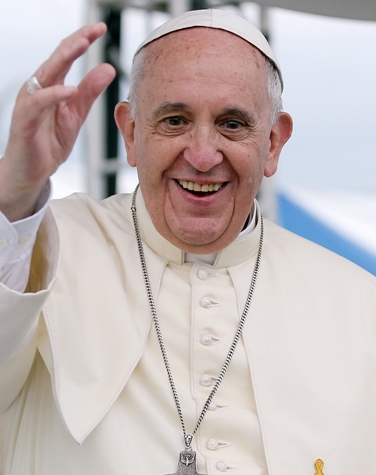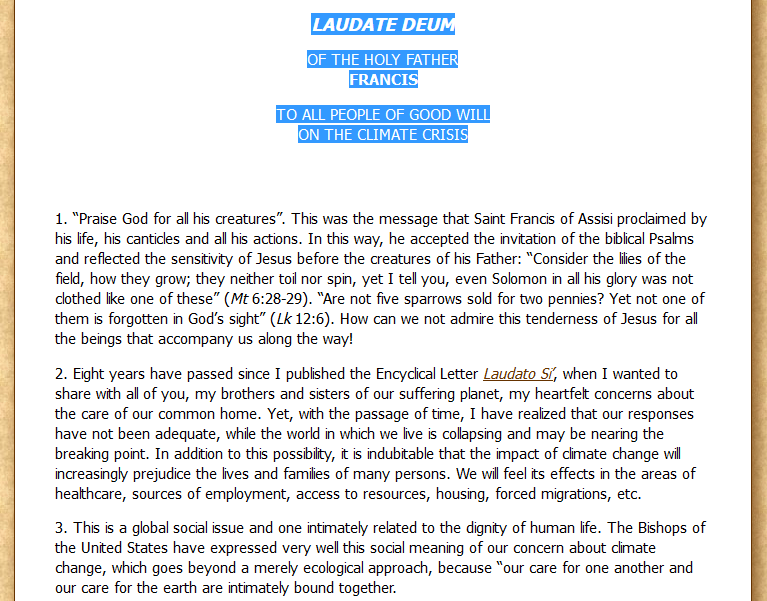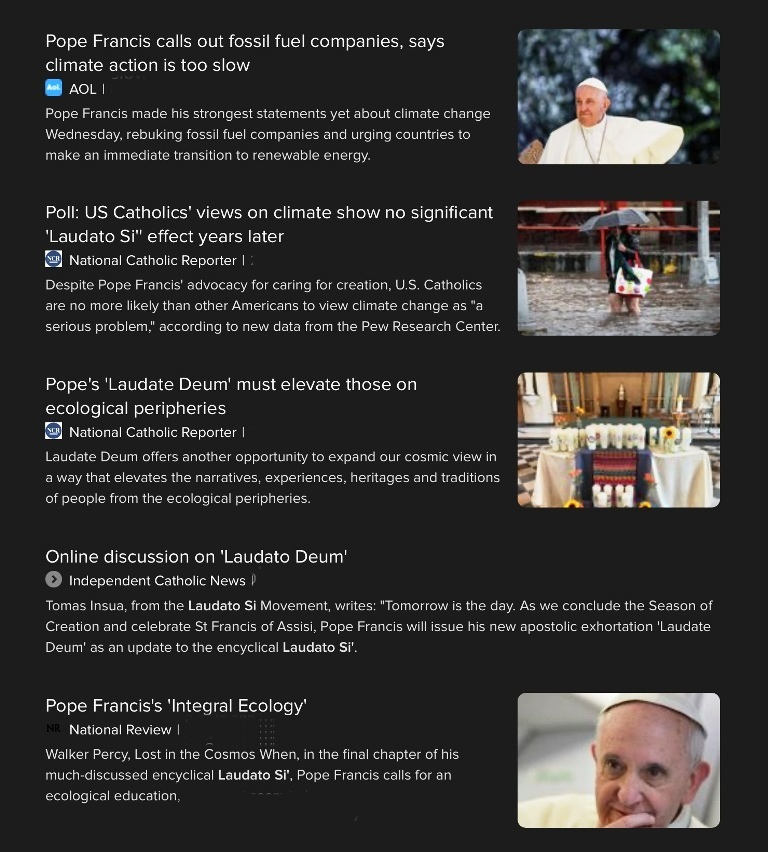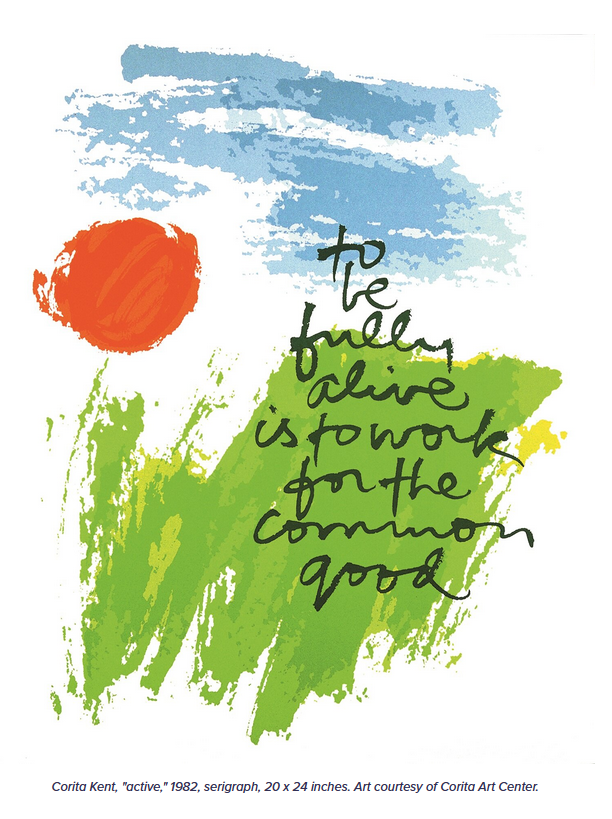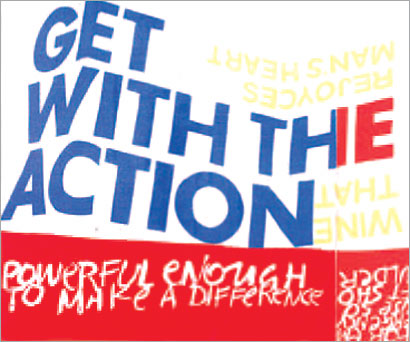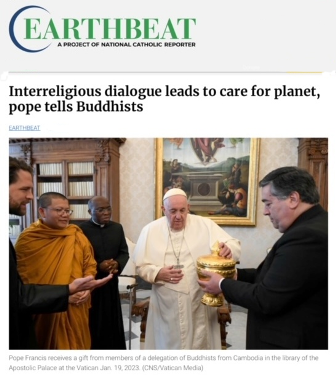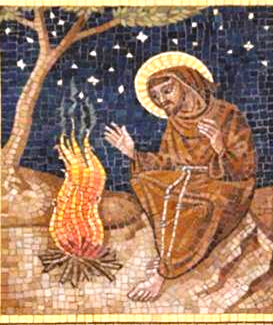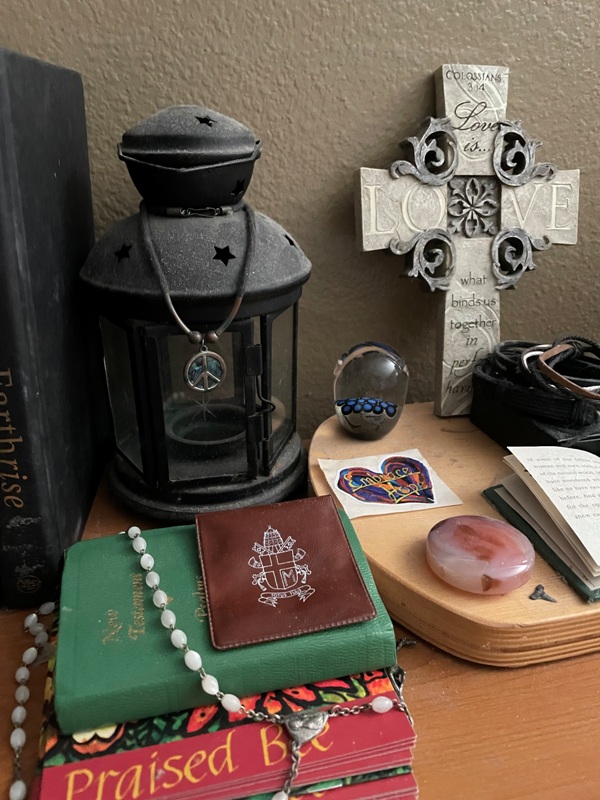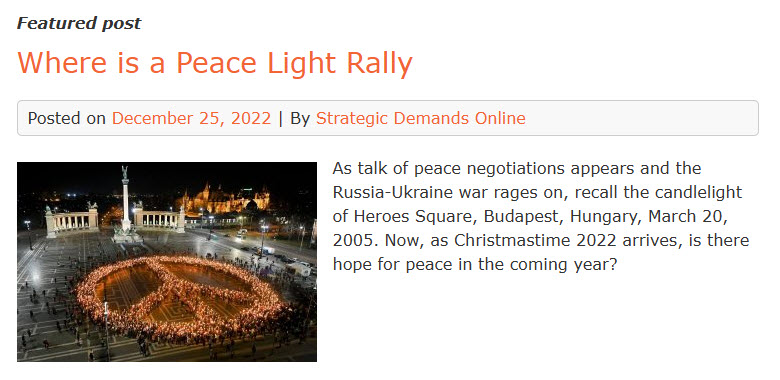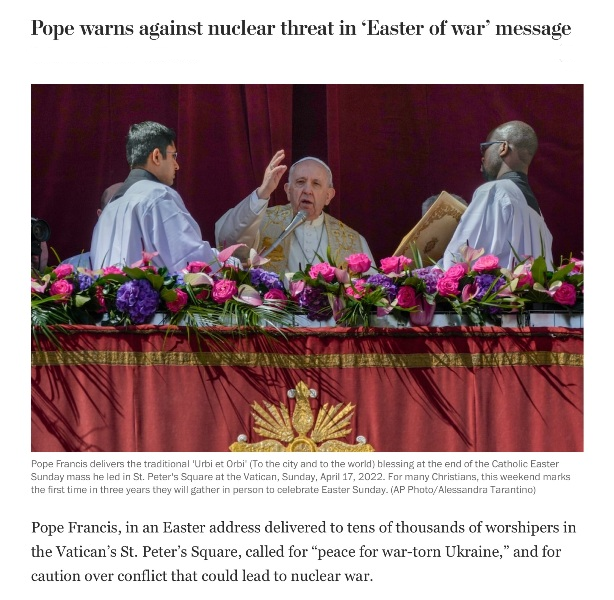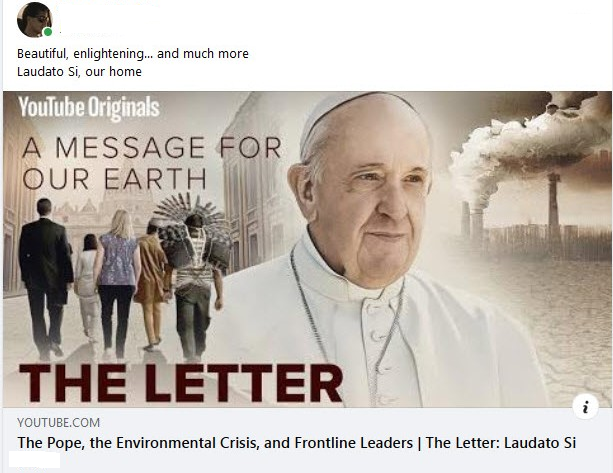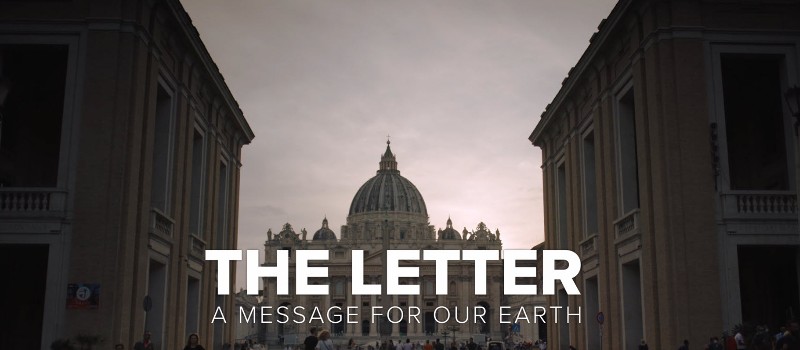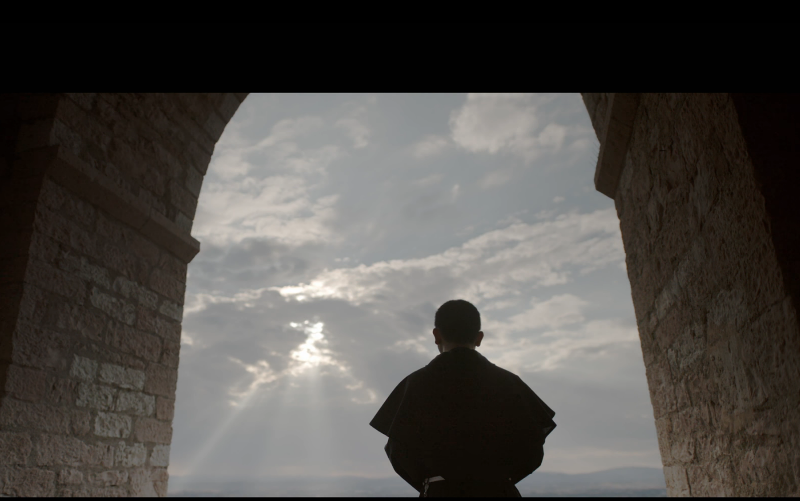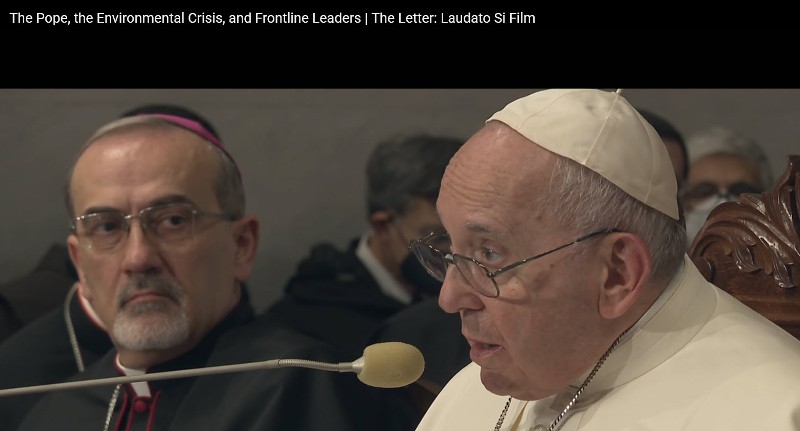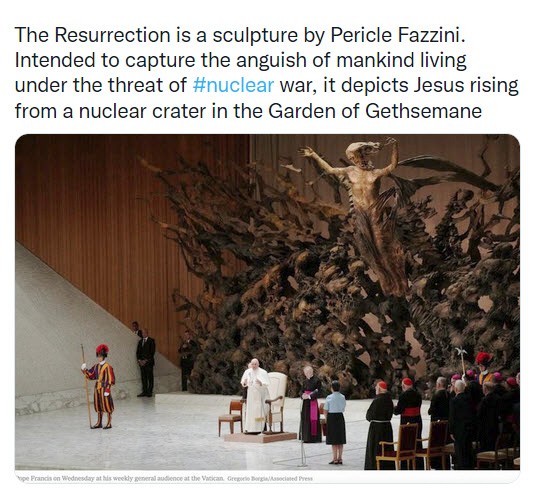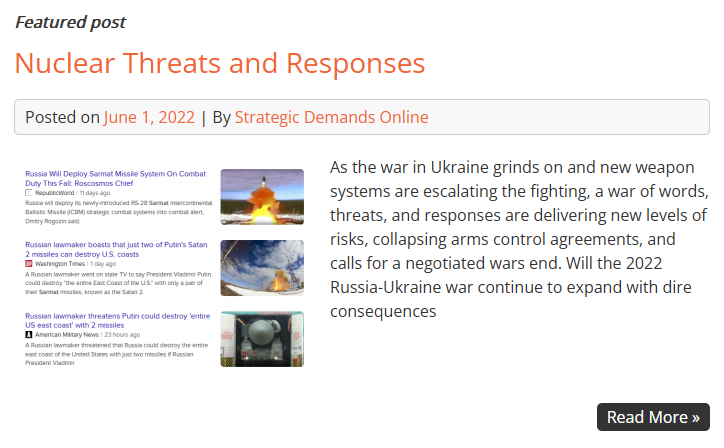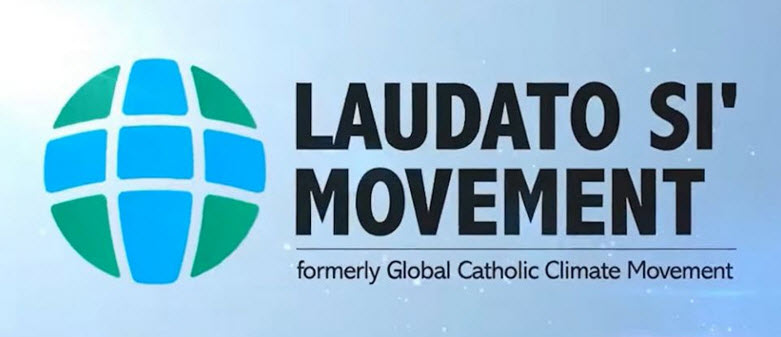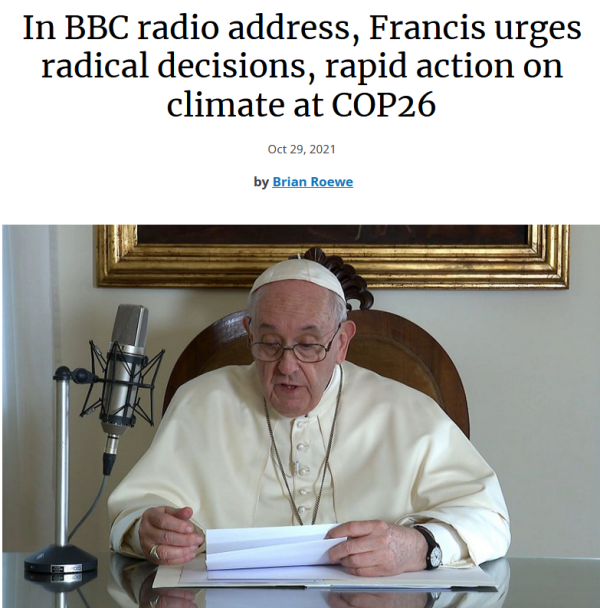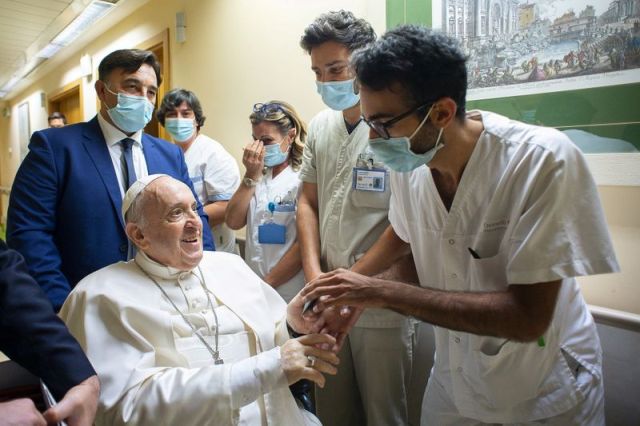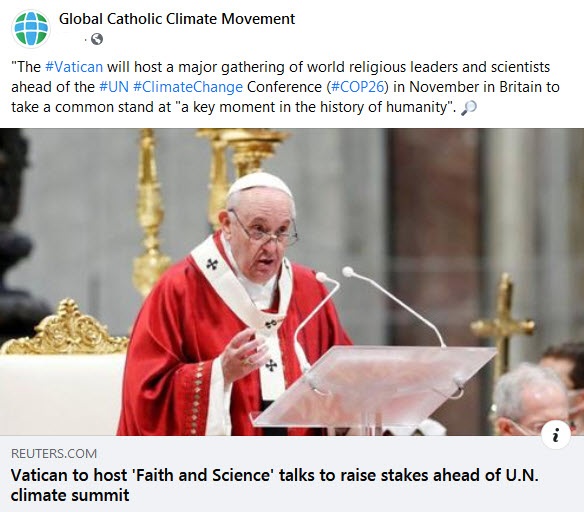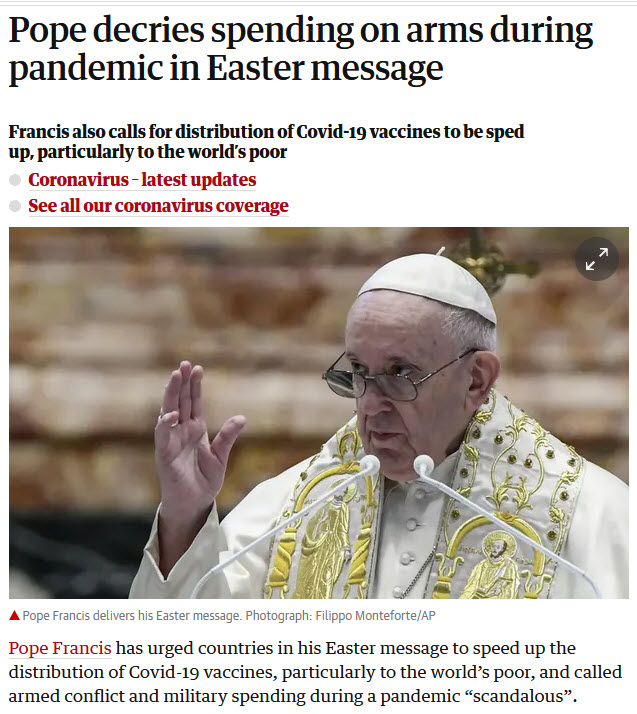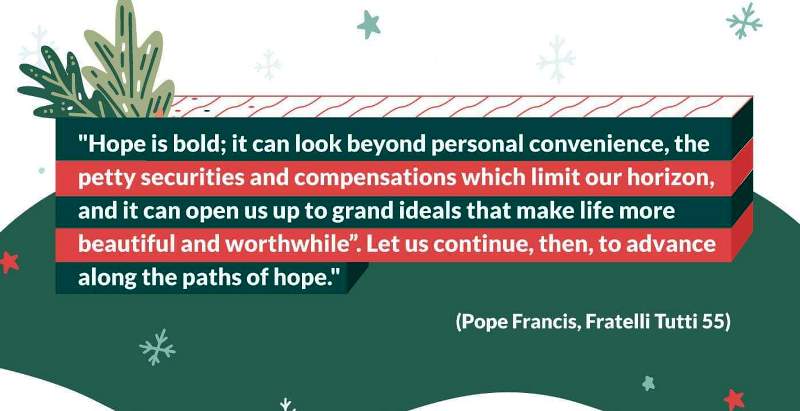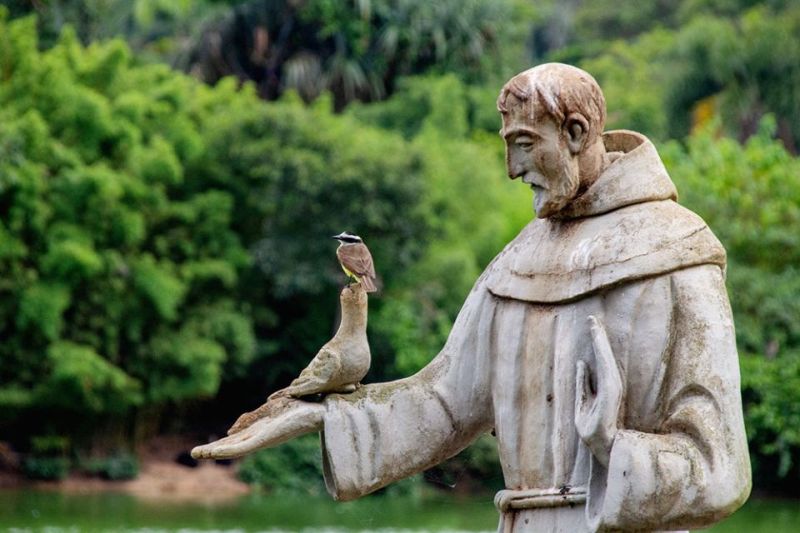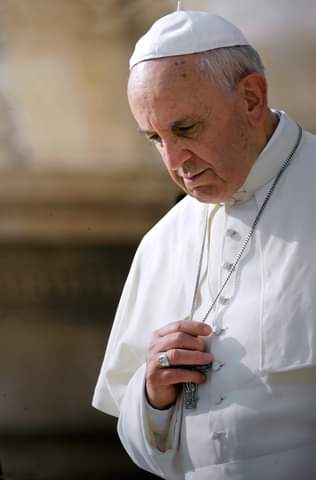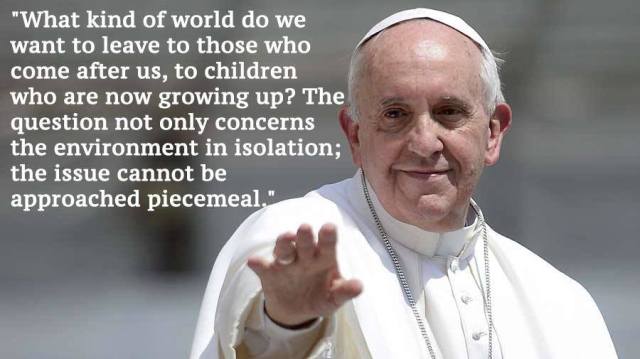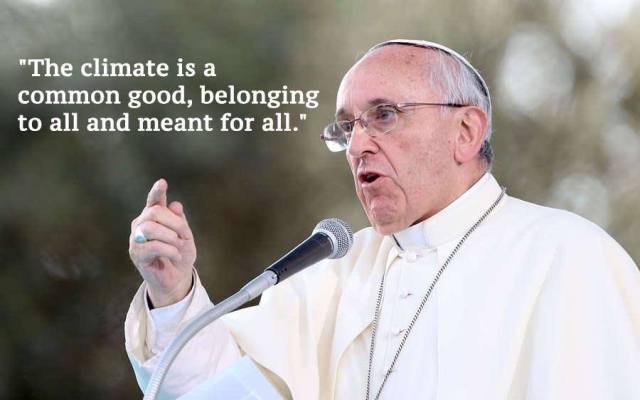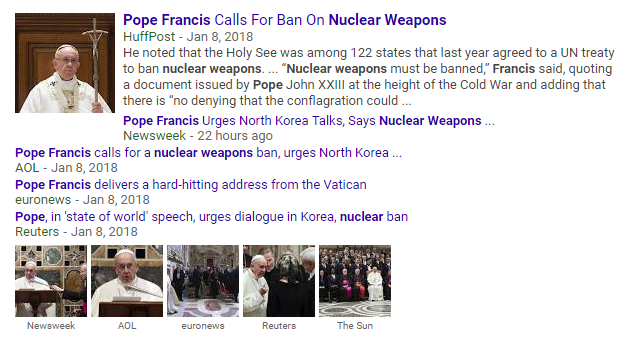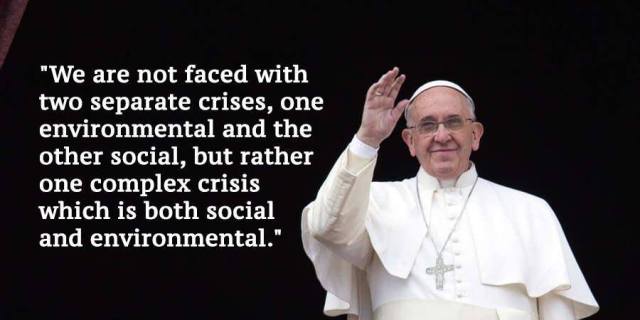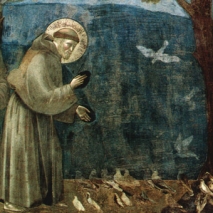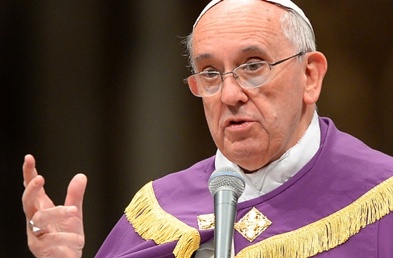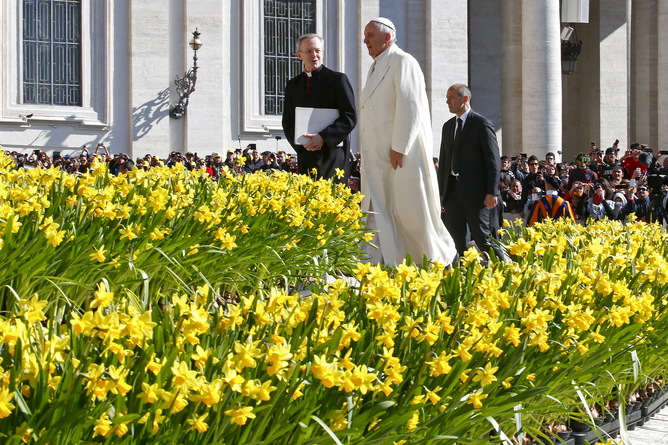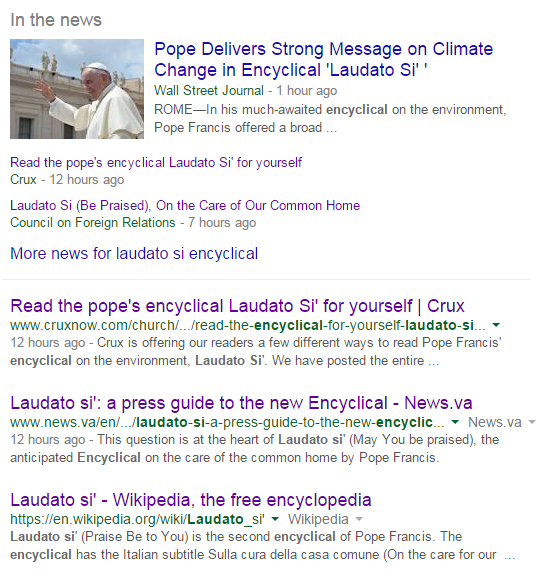Pope Francis on the Environment
New Encyclical from Pope Francis, a Transforming Vision
2023
The Catholic Church's Pontiff Again Highlights the 'Climate Crisis'
October 2023
Laudato Deum
🌎
Today is another historic Eco Day
On the first day of a global Catholic 'summit', a Laudate Deum call to protect the environment is announced following up the Laudato Si encyclical, a first-of-its-kind "Integral Ecology" letter to the billion+ members and to the interfaith global community. The release of the Catholic leader's new environmental letter is a global event, the second environmental encyclical, and carries forward a profound interfaith-catholic announcement/doctrine.
Many have spoken about a 'catholic' definition of citizen action and here a dictionary definition of the word -- catholic -- finds meaning in action.
- kăth′ə-lĭk, kăth′lĭk
- 1. Of broad or liberal scope; comprehensive.
- 2. Including or concerning all humankind; universal.
- 3. Of or involving the Roman Catholic Church.
Let's look more closely at the meaning and beliefs brought forward here. One can say, as with those who attempt to 'preserve and protect' life on Earth, that this is an eco-platform of a church called Catholic and is an ecumenical outreach worth considering universally, by all humankind. The ideas and ideals of respecting life and quality of life, is a goal we can all share.
From Earthbeat, and environmental movement
- Planet citizens in action
🌎
To be Fully Alive is to Work for the Common Good -- Get with the Action
_____________
Media release:
Via Vatican News
“Laudate Deum”: the Pope’s cry for a response to the climate crisis
Pope Francis has published an Apostolic Exhortation building on his 2015 encyclical. We’re not reacting enough, he says, we’re close to breaking point. He criticises climate change deniers, saying that the human origin of global warming is now beyond doubt. And he describes how care for our common home flows from the Christian faith.
In a new document titled “Laudate Deum,” or “Praise God,” the pope criticizes oil and gas companies for greenwashing new fossil fuel projects and calls for more ambitious efforts in the West to tackle the climate crisis. In the landmark apostolic exhortation, a form of papal writing, Francis says that “avoiding an increase of a tenth of a degree in the global temperature would already suffice to alleviate some suffering for many people.”
“Laudate Deum” is a follow-up to the pope’s 2015 encyclical on climate change, known as “Laudato Si’,” which lamented the exploitation of the planet and cast the protection of the environment as a moral imperative. When it was released, “Laudato Si’” was viewed as an extraordinary move by the head of the Catholic Church to address global warming and its consequences.
Nearly a decade later, the pope’s message has taken on new urgency.
____________________________________________________________
The "Summit", a Catholic 'Synod', Opening Day October 4, 2023
The Synod on Synodality, a gathering of bishops and others — including women and laypeople, a historical first — convened by Pope Francis to discuss a wide range of issues facing the church. With its broad mandate, collaborative process and open-ended topics, the gathering has alarmed many conservatives, including in the United States. They fear the conference could result in the church ordaining women as deacons, or blessing same-sex unions, among other possibilities.
The gathering opened in Rome today, October 4th, the same day the pope released a second part of his environmental encyclical Laudato Si.
🌎
Eco-religious Dialogue
🌎
2022
On Nov. 29, 1979, Pope John Paul II issued a papal bull that declared St. Francis of Assisi the patron of ecology and of those who promote ecology.
John Paul II wrote, “Among the holy and admirable men who have revered nature as a wonderful gift of God to the human race, St Francis of Assisi deserves special consideration.”
The pope went on to note Francis’ deep sense of the Creator at work in the world, and through it, the presence of the divine spirit. John Paul II mentioned too the “Canticle of the Creatures,” Francis’ famous prayer poem that is one of the cornerstones of Franciscan spirituality.
(The canticle’s recurring refrain “Praised be you, my Lord,” or in Umbrian dialect of early Italian, “Laudato Si’, mi signore,” inspired the name of Pope Francis’ 2015 encyclical on the environment and human ecology, “Laudato Si’, on Care for Our Common Home.” And it was Pope Francis who was the first to tap the Assisi saint as his papal namesake.)
Naming Francis of Assisi as the patron saint of ecology came at the end of the 1970s, a decade that witnessed the birth of the modern environmental movement and began with the celebration of the first Earth Day, held in the United States.
🌎
🌎
October 2022
The Letter: Laudato Si
- The Pope, the Environmental Crisis, and Frontline Leaders
An Original Film, October 2022
- 1,084,581 views as of Oct 4, 2022
························································
Pope Francis on the Environment
In 2015, Pope Francis wrote Laudato Si’; an Encyclical Letter about the environmental crisis to every single person in the world.
In Laudato Si’, the Encyclical Letter we are encouraged to see how "everything is connected."
In Laudato Si’, the Film, we are encouraged to see how the way we treat the Earth, our common home, is a reflection of how we treat each other. Caring for each other means caring for the home we share.
Laudato Si’, the Film, introduces us to "four voices that have gone unheard in global conversations" who have been invited to an unprecedented dialogue with the Pope. Hailing from Senegal, the Amazon, India, and Hawai’i, they bring perspective and solutions from the poor, the indigenous, the youth, and wildlife into a conversation with Pope Francis himself.
The documentary follows their journey to Rome and the extraordinary experiences that took place there, and is packed with powerfully moving personal stories alongside the latest information about the planetary crisis and the toll it’s taking on nature and people.
🌎
🌎
August 2022
GreenPolicy360: As many know, the Catholic Pontiff is a leader in the international nuclear nonproliferation movement. The Vatican recently drew attention to this anti-nuclear monumental sculpture... which a staff member of the United Nations shared this third week of August, as the Russian-Ukraine war continues in its sixth month, and with the threat of nuclear weapons and nuclear disaster rising ...
- The Resurrection is a sculpture by Pericle Fazzini.
- It is intended to capture the anguish of mankind living under the threat of #nuclear war.
- It depicts Jesus rising from a nuclear crater in the Garden of Gethsemane.
- It is intended to capture the anguish of mankind living under the threat of #nuclear war.
- The Resurrection is a sculpture by Pericle Fazzini.
GreenPolicy360: What does the Russia-Ukraine war mean for nuclear weapons arm control, acceleration of a new nuclear weapons arms race, escalating development and 'modernization' of Chinese, Russian, and U.S. nuclear weapons arsenals? As nuclear treaties globally and nuclear arms control architecture, built with great effort over decades, are collapsing, the war has incentivized a move away from negotiations. The nuclear weapons nations are moving toward new nukes, more 'usable' nukes, more 'indefensible' nukes, more proliferation... Rapidly increasing threats of nuclear use and nuclear catastrophe are results of the Russia-Ukraine war.
'Nuclear disarmament, arms control, & non-proliferation' profoundly set back by Russia's war
UNIDIR
The Disarmament, Arms Control, and Non-Proliferation Implications of the Invasion of Ukraine – and What Next for Reducing Global Nuclear Dangers
Nuclear Threats, Responses & Ripple Effects
- The Russia - Ukraine War Continues Raising New Nuclear Risks
- Visit GreenPolicy360's Colleague 'Strategic Demands' for More...
○
March 24 / Pope Francis said today that the “shameful war” in Ukraine was the result of “the old logic of power that still dominates so-called geopolitics.” He called increased defense spending by Western nations “madness,” saying that more arms and sanctions wouldn't solve the conflict and urging a different kind of international relations built on caring rather than on economic and military power.
2021
November 2021
Speaking in Athens, Greece, Pope Francis warned Americans, “We cannot avoid noting with concern how today, and not only in Europe, we are witnessing a retreat from democracy." Pope Francis warned against politicians with "an obsessive quest for popularity, in a thirst for visibility, in a flurry of unrealistic promises,” and the Pope implored people around the world to turn away from authoritarianism, individualism, and indifference. He spoke of looking to the common good and strengtheniing democracy.
October 2021
London — Pope Francis took to British airwaves Friday morning with a call for radical decisions and rapid action at the pivotal COP26 climate summit, saying the political leaders and diplomats descending on the United Kingdom are "urgently summoned to provide effective responses to the present ecological crisis" both for people today and for future generations.
"The political decision-makers who will meet at COP26 in Glasgow are urgently summoned to provide effective responses to the present ecological crisis and in this way to offer concrete hope to future generations," Francis said.
(M)oments of difficulty like these also present opportunities, opportunities that we must not waste. We can confront these crises by retreating into isolationism, protectionism and exploitation. Or we can see in them a real chance for change, a genuine moment of conversion, and not simply in a spiritual sense."
"It means giving priority to the common good, and it calls for a change in perspective, a new outlook, in which the dignity of every human being, now and in the future, will guide our ways of thinking and acting."
The BBC radio address was Francis' latest in a string of messages this year calling for radical actions to emerge from COP26. On Oct. 4, he joined other religious leaders in a joint appeal to leaders who will gather in Glasgow.
They called for nations to implement policies that will limit average temperature rise to 1.5 degrees Celsius and for more industrialized countries to deliver on pledges of financing to help emerging economies mitigate climate change and build resilience to the impacts they are already experiencing and those still to come.
~
August 2021
From ‘Global Catholic Climate Movement’ to ‘Laudato Si' Movement’
"I think it is a door opening for us to involve everyone in the protection and care for our common home, and to keep pushing forward integral ecology, climate justice and social justice for everyone."
·························································································································································
After surgery and hospital recuperation
VATICAN CITY (Reuters) - Pope Francis will attend the United Nations Climate Change Conference (COP26) in Glasgow in November, health permitting, Scotland’s Roman Catholic bishops said on Monday.
The UN Climate Change Conference will take place from 31 October to 12 November 2021 in the Scottish Event Campus (SEC) in Glasgow, UK.
··························································································
Spring 2021
Winter 2020
New Encyclical from Pope Francis, a Transforming Vision
Pope Francis sets out a 'transforming vision', a new encyclical in an era of crisis
The first Catholic Pope to name himself after the saint of ecology and nature
September 2020
Pope urges respect for Paris climate accord, says 'creation is groaning'
Modern society has pushed the planet beyond its limits and the time to fix a climate emergency was running out, he said on the 'World Day of Prayer for the Care of Creation'.
“Our constant demand for growth and an endless cycle of production and consumption are exhausting the natural world,” Francis said. “Forests are leached, topsoil erodes, fields fail, deserts advance, seas acidify and storms intensify. Creation is groaning!”
Pope Francis said biodiversity loss, climate disasters, and the disproportionate impact of the coronavirus pandemic on the poor and vulnerable were all a “wakeup call in the face of our rampant greed and consumption”.
August 2020
Remembering 75 Years Ago
June 2020
EarthBeat Weekly: Faith climate leaders speak out on racial injustice
"Three words connect it all: I can't breathe."
·············································
(Via Reuters) / June 2020
Five Years after the First Eco-Encyclical of the Catholic Church
Living Pope Francis' encyclical "Laudato Si', on Care for Our Common Home":
The Vatican urged Catholics on Thursday (June 18, 2020) to disinvest from the armaments and fossil fuel industries and to closely monitor companies in sectors such as mining to check if they are damaging the environment.
The calls were contained in a 225-page manual for church leaders and workers to mark the fifth anniversary of Pope Francis’ landmark 2015 encyclical “Laudato Si” (Praised Be to You: On Care for Our Common Home) on the need to protect nature, life and defenseless people.
The compendium suggests practical steps to achieve the goals of the encyclical, which strongly supported agreements to contain global warming and warned against the dangers of climate change.
The manual’s section on finance said people “could favor positive changes ... by excluding from their investments companies that do not satisfy certain parameters.” It listed these as respect for human rights, bans on child labor and protection of the environment.
Called ‘Journeying Towards Care For Our Common Home’, one action point called on Catholics to shun “shun companies that are harmful to human or social ecology, such as abortion and armaments, and to the environment, such as fossil fuels”.
Another section called for the “stringent monitoring” of extraction industries in areas with fragile ecosystems to prevent air, soil and water contamination.
○
May 2020
"It should always be kept in mind that 'environmental protection cannot be assured solely on the basis of financial calculations of costs and benefits. The environment is one of those goods that cannot be adequately safeguarded or promoted by market forces'. Once more, we need to reject a magical conception of the market, which would suggest that problems can be solved simply by an increase in the profits of companies or individuals. Is it realistic to hope that those who are obsessed with maximizing profits will stop to reflect on the environmental damage which they will leave behind for future generations?" (Laudato Si, 190)
○
April 2020
In his message on Easter Sunday, the pope called on world leaders to care for the poor, refugees and homeless people. He urged the relaxation of international sanctions, saying they hinder countries from adequately supporting their citizens. And he demanded the reduction, “if not the forgiveness,” of the debts of the poorest nations so that they could best “meet the greatest needs of the moment.”
Francis urged a “global cease-fire in all corners of the world” and an end to conflicts and hostilities in Syria, Yemen, Iraq, Lebanon and many African countries, and for renewed dialogue in the Middle East. He also called for unity and solidarity within the European Union, which “is presently facing an epochal challenge, on which will depend not only its future but that of the whole world.”
The pandemic, he added, should not obscure the grave humanitarian crises that has crippled many parts of the world...
○
In a Easter letter to the world, Francis speaks of a special memory and recognition of "women, who multiply loaves of bread in soup kitchens" with little material "for hundreds of children"; of the sick and the elderly, so often forgotten in this lonely sick society; of peasants and family farmers "produce healthy food without destroying nature" taking care of the Common House and attending to the needs of the humble and hard-working people.
For a universal salary
Faced with the reality of lack of basic living protections, the Pope speaks for the poor. Pope Francis considers that it is "time to consider a universal basic wage which would acknowledge and dignify the noble, essential tasks you carry out. It would ensure and concretely achieve the ideal, at once so human and so Christian, of no worker without rights". The humble and hard-working people to whom "Heavenly Father watches over you, values you, appreciates you, and supports you in your commitment."
People at the center of life
In this context of the huge impact of the coronavirus worldwide, Francisco says "Now more than ever, persons, communities and peoples must be put at the centre, united to heal, to care and to share."
In the letter, Francis invites the popular movements to "reflect on "life after the pandemic" and address the "grave consequences that are already being felt". This experience of the Pope's dialogue with the popular movements, develops from a culture of encounter and "the wisdom that are kneaded with the leaven of feeling the suffering of others as your own."
"I want all of us to think about the project of integral human development that we long for and that is based on the central role and initiative of the people in all their diversity, as well as on universal access to those three Ts that you defend: Trabajo (work), Techo (housing), and Tierra (land and food)..."
"I hope that this time of danger will free us from operating on automatic pilot, shake our sleepy consciences and allow a humanist and ecological conversion that puts an end to the idolatry of money and places human life and dignity at the centre. Our civilization needs to downshift, take stock, and renew itself."
"Popular movements are “indispensable builders of this change that can no longer be put off. Moreover, when you testify that to change is possible, your voice is authoritative. You have known crises and hardships ... that you manage to transform into a promise of life for your families and your communities."
··································
February 2020
In a 94-page document entitled “Querida Amazonia” (Dear Amazon), Pope Francis has made an impassioned plea for world leaders, transnational companies, and people everywhere to step up and protect the Amazon rainforest along with the indigenous people who live there and are its best stewards.
The Amazon is seeing rapid deforestation in Brazil, Peru, Bolivia and Colombia, while violence against indigenous people is rising. Scientists say climate change and deforestation are forcing a forest-to-savanna tipping point, which could lead to a massive tree die-off, the release of huge amounts of CO2, and global climate catastrophe.
“We are water, air, earth and life of the environment created by God,” Pope Francis writes in Dear Amazon. “For this reason, we demand an end to the mistreatment and destruction of mother Earth. The land has blood, and it is bleeding; the multinationals have cut the veins of our mother Earth.”
··································
November 2019
Pope urges abolition of nuclear weapons during Japan visit
24 November 2019
Pope Francis has made an impassioned appeal for the abolition of nuclear weapons during a visit to Nagasaki, one of the two Japanese cities targeted by atomic bombs during World War Two.
He decried the "unspeakable horror" of nuclear weapons and insisted they were "not the answer" for global peace.
At least 74,000 were killed in Nagasaki by the attack by US forces in 1945...
In a sombre ceremony, the Pope unequivocally condemned the use of nuclear weapons.
"This place makes us deeply aware of the pain and horror that we human beings are capable of inflicting upon one another"...
In Hiroshima today, Pope Francis declared the use and possession of atomic weapons "immoral."
···········································
A quote from Pope Francis / in address to the U.N. General Assembly:
“First, it must be stated that a true 'right of the environment' does exist, for two reasons. First, because we human beings are part of the environment. We live in communion with it, since the environment itself entails ethical limits which human activity must acknowledge and respect. Man, for all his remarkable gifts, which 'are signs of a uniqueness which transcends the spheres of physics and biology,' is at the same time a part of these spheres. He possesses a body shaped by physical, chemical and biological elements, and can only survive and develop if the ecological environment is favourable. Any harm done to the environment, therefore, is harm done to humanity. Second, because every creature, particularly a living creature, has an intrinsic value, in its existence, its life, its beauty and its interdependence with other creatures. We Christians, together with the other monotheistic religions, believe that the universe is the fruit of a loving decision by the Creator, who permits man respectfully to use creation for the good of his fellow men and for the glory of the Creator; he is not authorised to abuse it, much less to destroy it. In all religions, the environment is a fundamental good.”
New Direction with a New Vision
An old Catholic Church continues on a new path with an eco-Pope
Catholics call Trump's move from Paris climate deal 'unconscionable'
······································
Laudato Si' Conference
July 5 - 6, 2018
······························································
Via Financial Times / June 9, 2018
Pope Francis urges oil and gas groups to tackle climate change
Catholic head warns there is ‘no time to lose’ on transition away from fossil fuels
The Pope has warned major oil company heads that there is “no time to lose” to address climate change, and urged them to speed up the transition away from fossil fuels...
“This is a challenge of epochal proportions,” said Pope Francis on Saturday, as he addressed a summit of energy leaders at the Vatican.
The Pope said it was “disturbing and a cause for real concern” that carbon emissions had continued to rise following the Paris climate agreement that commits to keeping the rise in global temperatures to less than 2C from the pre-industrial era.
“Even more worrying is the continued search for new fossil fuel reserves, whereas the Paris agreement clearly urged keeping most fossil fuels underground.”
The highly unusual gathering of top energy chiefs at the Vatican underscores the growing role that the Roman Catholic Church has played in advocating for climate protection — as well as oil and gas companies’ increasing focus on this issue.
Among the some 50 participants were Darren Woods, CEO of ExxonMobil, Claudio Descalzi, head of Italy’s ENI, Bob Dudley of BP, Eldar Saetre, CEO of Norwegian oil firm Equinor (formerly called Statoil), Vicki Hollub of Occidental Petroleum, and investors including Larry Fink of BlackRock.
Via Reuters / Environment / June 9, 2018
Pope warns energy bosses of global destruction without fuel shift
“Our desire to ensure energy for all must not lead to the undesired effect of a spiral of extreme climate changes due to a catastrophic rise in global temperatures, harsher environments and increased levels of poverty,” the Catholic leader told the gathering.
He said the transition to accessible and clean energy was “a duty that we owe towards millions of our brothers and sisters around the world, poorer countries and generations yet to come”.
Pope Francis has been a vocal supporter of the Paris climate agreement and has urged Catholics to care of the environment and for the poor, who he says are most likely to be hurt by climate change.
Via Axios - Reuters / June 1, 2018
Pope convenes big oil, investors to talk climate change
Pope Francis, who wrote a major document on protection of the environment from global warming in 2015, personally is expected to address the energy group on the last day of the June 8-9 conference.
The conference, organized by the University of Notre Dame in the United States, is expected to be attended by the heads or senior executives of the top energy companies including Exxon Mobil, Eni, BP, Royal Dutch Shell and Pemex.
Participants in the private conference expected to attend include:
- • Bob Dudley, CEO of BP.
- • Darren Woods, CEO of ExxonMobil.
- • Eldar Sætre, CEO of Equinor, oil and energy producer partially owned by the Norwegian government (formerly Statoil).
- • Ernest Moniz, former U.S. Energy Secretary under then-President Obama.
- • John Browne, former CEO of BP and current executive chairman of L1 Energy, an oil and gas investment firm.
- • Larry Fink, CEO of BlackRock, world’s largest asset manager.
- • (additional names to be made public}
Situational awareness: One year ago today, U.S. president Donald Trump announced his intention to withdraw America from the international climate agreement, which now has support from every country except the United States. Three years ago, Pope Francis wrote his eco-encyclical — a papal document that set a historic precedent as the Catholic Church put forward guidelines on the importance of addressing the environment and climate change, a first in the church’s history.
The focus of the gathering is similar to the encyclical “On Care For Our Common Home” with an emphasis on the energy transition of a “shared home.”
VATICAN CITY (Reuters) - Denying climate change or being indifferent to its effects are “perverse attitudes” that block research and dialogue aimed at protecting the future of the planet...
The Catholic leader explained: “We have to avoid falling into these four perverse attitudes, which certainly do not help honest research and sincere and productive dialogue on building the future of our planet: negation, indifference, resignation and trust in inadequate solutions.”
Francis called climate change “one of the worst phenomena that our humanity is witnessing”.
·······································································
"Protect, Do Not Destroy the Environment"
VATICAN CITY, January 8 (Reuters) - Pope Francis called for all nations to support dialog to ease tensions on the Korean peninsula and to work for a legally binding ban on nuclear weapons.
“Nuclear weapons must be banned,” Francis said, quoting a document issued by Pope John XXIII at the height of the Cold War and adding that there is “no denying that the conflagration could be started by some chance and unforeseen circumstance.”
He noted that the Holy See was among 122 states that last year agreed to a United Nations treaty to ban nuclear weapons. The United States, Britain, France and others boycotted the talks that led to the treaty, instead pledging commitment to a decades-old Non-Proliferation Treaty.
“It is of paramount importance to support every effort at dialog on the Korean peninsula, in order to find new ways of overcoming the current disputes, increasing mutual trust and ensuring a peaceful future for the Korean people and the entire world,” Francis said, addressing the nuclear crisis between North Korea and the United States.
·······································································
December/November/October 2017
VATICAN CITY (Reuters) - Pope Francis appeared to harden the Catholic Church’s teaching against nuclear weapons on November 10th, saying countries should not stockpile them even for the purpose of deterrence.
His remarks, at the start of a disarmament conference that brought 11 Nobel Peace Prize winners to the Vatican, appeared to go further than previous popes. They have said that while nuclear weapons should never be used, holding arsenals solely to deter other countries from using them could be morally acceptable as a step toward achieving a nuclear-free world.
Addressing the group in the 16th century frescoed Clementine Hall of the Vatican’s Apostolic Palace, Francis spoke of “the catastrophic humanitarian and environmental effects of any employment of nuclear devices”.
"International relations cannot be held captive to military force, mutual intimidation, and the parading of stockpiles of arms," the pope continued. "Weapons of mass destruction, particularly nuclear weapons, create nothing but a false sense of security. They cannot constitute the basis for peaceful coexistence between members of the human family."
He added: “If we also take into account the risk of an accidental detonation as a result of error of any kind, the threat of their use, as well as their very possession, is to be firmly condemned.”
August 2017
“We must never forget that the natural environment is a collective good, the patrimony of all humanity and the responsibility of everyone.”
June 2017
Trump's decision to pull out of the Paris agreement has attracted scathing comments from world leaders, politicians, entrepreneurs, and pretty much everyone who doesn’t want to do terrible damage to our planet.
The decision has even drawn the wrath of the Vatican, which Trump visited just last week. Bishop Marcelo Sanchez Sorondo, head of the Pontifical Academy of Sciences, made his critical remarks known in an interview with Italian newspaper La Repubblica.
“Thinking that we need and must rely on coal and oil is like claiming that the Earth is not round. It’s an absurdity brought forward only to make money,” Sanchez Sorondo stated. “I believe that oil lobbyists are behind this decision. They are pushing for it. Big oil is pulling Trump's strings and he can’t oppose them, although this doesn’t mean he wants to.”
In his state visit to the Vatican, Pope Francis gifted Trump a copy of his encyclical on climate change, which he wrote himself. Trump also discussed climate change with Cardinal Pietro Parolin, the Secretary of State for the Vatican. Trump promised to think about his discussion with the Bishop of Rome, but clearly he didn’t think hard enough.
May 2017 ... Pope Asks Trump to Be Peacemaker and gives the US president copies of a personal nonviolence message and the Catholic Eco-encyclical on "Care for Our Common Home" — Laudato Si’
September 2016 ... Via the Guardian -- "Destroying the Environment Is a Sin" Pope Francis speaks out on whole earth life issues, green issues, the commons, our responsibility for protecting and sustaining biodiversity, ecosystems, and carrying forward the first Catholic encyclical on the environment — Laudato Si'
Thanksgiving Day, U.S., November 26, 2015 ... Via the New York Times Kenya: After celebrating his first public Mass on the continent at a rain-soaked ceremony before 300,000 faithful, Pope Francis warned that it would be "catastrophic" for world leaders to let special interest groups get in the way of a global agreement to curb fossil fuel emissions on the eve of crucial climate change talks in Paris.
"It would be sad, and dare I say even catastrophic, were special interests to prevail over the common good and lead to manipulating information in order to protect their own plans and interests."
Francis has made ecological concerns a hallmark of his nearly 3-year-old papacy, issuing a landmark encyclical earlier this year that paired the need to care for the environment with the need to care for humanity's most vulnerable. Francis argues the two are interconnected since the poor often suffer the most from the effects of global warming, and are largely excluded from today's fossil-fuel based global economy that is heating up the planet.
Francis took particular aim at those who reject the science behind global warming. In the United States, that includes some Republican presidential candidates and lawmakers, who have opposed steps President Barack Obama has taken on his own to cut greenhouse gas emissions...
August 2015 -- The Pope and the Planet
by Bill McKibben / NY Review of Books
>Laudato Si’ stands as one of the most influential documents of recent times.
>It is, therefore, remarkable to actually read the whole document and realize that it is far more important even than that. In fact, it is entirely different from what the media reports might lead one to believe.
>Instead of a narrow and focused contribution to the climate debate, it turns out to be nothing less than a sweeping, radical, and highly persuasive critique of how we inhabit this planet—an ecological critique, yes, but also a moral, social, economic, and spiritual commentary.
>In scope and tone it reminded me instantly of E.F. Schumacher’s Small Is Beautiful (1973), and of the essays of the great American writer Wendell Berry. As with those writers, it’s no use trying to categorize the text as liberal or conservative; there’s some of each, but it goes far deeper than our political labels allow...
June 2015
The promised eco-encyclical is here -- we visit the press conference introducing 'Laudato Si'
"Read the encyclical for yourself..." Laudato Si': On the Care of Our Common Home
America magazine takes a closer look
First look at the eco-spirituality and reflections of an eco-encyclical
May 2015
Francis endorses climate action petition
April 2015
At climate change summit Cardinal Peter Turkson warns on burning of fossil fuels, in a likely precursor to highly anticipated encyclical on the environment... “[The soon-to-be-released encyclical] will convey to the world that protecting our environment is an urgent moral imperative and a sacred duty for all people of faith and people of conscience,” UN Secretary General Ban Ki-moon said.
While he declined to comment on any details of the encyclical following his morning meeting with the Argentinean pontiff – the document has already been written and is being translated – he said he was counting on the pope’s “moral voice and moral leadership” to help accelerate talks.
Pope Francis’s September address will be the first time any pope has spoken before a special session of the general assembly.
Pope Francis Steps Up Campaign on Climate Change
Pope Francis throws the weight of his office behind tackling climate change
○ ○ ○ ○ ○ ○ ○ ○ ○ ○ ○ ○ ○
"Integral Ecology"
On the Meaning of an "Integral Ecology" within an "Eco-Encyclical" @GreenPolicy360
○ ○ ○ ○ ○ ○ ○ ○ ○ ○ ○ ○ ○
Pope as Messenger: Making climate change a moral issue @The Conversation
March 2015
Preparing for the upcoming environmental 'eco-encyclical'
Majority of Catholics in the U.S. Are Worried About Climate Change and Support Immediate Action
February 2015
Pope Francis popularity polls at 90% and is widely positive
January 2015
Catholic 2015 Climate 'Encyclical'
- Pontiff hopes to inspire action at next year’s UN meeting in Paris in December
- In 2015, the pope will issue a lengthy message on the subject to the world’s 1.2 billion Catholics, give an address to the UN general assembly, and call a summit of the world’s main religions
The reason for such activity, says Bishop Marcelo Sorondo, chancellor of the Vatican’s Pontifical Academy of Sciences, is the pope’s wish to directly influence next year’s crucial UN climate meeting in Paris, when countries will try to conclude 20 years of fraught negotiations with a universal commitment to reduce emissions.
Next year, he will also issue a rare papal encyclical in March on climate change and human ecology, all part of an attempt strongly to influence the UN climate change meeting in Paris in 2015 to achieve a universal commitment to reduce carbon emissions.
Regarding the upcoming environmental encyclical
"Just as humanity confronted revolutionary change in the 19th century at the time of industrialisation, today we have changed the natural environment so much," Bishop Sorondo told a London meeting of Cafod, the Catholic development agency. "If current trends continue, the century will witness unprecedented climate change and destruction of the ecosystem with tragic consequences."
○
“Eco-theology” alarms creationists and divides the Catholic church. Opponents, including some in the Vatican, condemn it as “un-biblical”. Pope Francis sees economic inequality and the plundering of the Earth’s resources as part of a theme. He has said: “In this system, which tends to devour everything which stands in the way of accrued profits, whatever is fragile like the environment is defenceless against the interest of a deified market, which becomes the only rule.”
○
Pope Francis, the leader of one in six of the world’s population (41% in Latin America), is undoubtedly a man of change and with huge potential leverage.
Neil Thorns, head of advocacy at Cafod, was quoted by the Observer saying "The anticipation around Pope Francis's forthcoming encyclical is unprecedented. We have seen thousands of our supporters commit to making sure their MPs know climate change is affecting the poorest communities."
○
There's been enormous enthusiasm for the Pope and the themes he's focused on - helping the poor, the importance of the family, and protecting the environment. -BBC
Pope Francis in Manila: Six million attend outdoor Mass
○ ○ ○ ○ ○ ○ ○ ○ ○ ○
On Nuclear Weapons
April-May 2015
Catholics Press for Nuclear Weapons Ban at UN Treaty Review Conference
December 2014
The Catholic Church Formulates a New Policy on Ethics of Nuclear Deterrence
Message from Pope Francis to International Conference [1] [2] [3]
○ ○ ○ ○ ○ ○ ○ ○
- Climate Change
Dec 31st, 2014, Democracy Now http://m.democracynow.org/stories/14898
On the upcoming encyclical/video
AMY GOODMAN: This is Democracy Now! democracynow.org, The War and Peace Report. I’m Amy Goodman, for our last report of 2014.
Pope Francis is set to make history by issuing the first-ever comprehensive Vatican teachings on climate change. In an effort to urge Catholics worldwide to take climate action, the pope will issue a rare papal letter, or encyclical, on climate change and human ecology, following a visit in March to Tacloban, the Philippine city devastated in 2012 by Typhoon Haiyan. The document then will be sent to the world’s 5,000 Catholic bishops and 400,000 priests, who will distribute it to their parishioners.
Given the sheer number of people who identify as Catholics worldwide, the pope’s clarion call to tackle climate change could reach far more people than even the largest environmental groups. Globally, there are 1.2 billion Catholics, of which around 75 million live here in the United States. The pope also plans to address the United Nations General Assembly and convene a summit of the world’s main religions in hopes of bolstering next year’s crucial U.N. climate summit in Paris.
Last year, during his first Christmas mass as head of the Catholic Church, Pope Francis called for protection of the environment from human greed.
-- POPE FRANCIS: [translated] Lord of heaven and Earth, look upon our planet, frequently exploited by human greed and rapacity. Help and protect all of the victims of natural disasters, especially the beloved people of the Philippines gravely affected by the recent typhoon.
AMY GOODMAN: This year, Pope Francis shocked cardinals, bishops and priests by using his annual Christmas remarks to deliver a scathing critique of the Vatican itself, the central governing body of the Catholic Church. He said the Vatican is plagued with "spiritual Alzheimer’s," "existential schizophrenia," "social exhibitionism" and a lust for power—all of which have resulted in an "orchestra that plays out of tune," he said. Pope Francis also lambasted the gossip, pettiness and rivalry he said were infecting the church. This is part of what he said.
-- POPE FRANCIS: [translated] There is also the sickness of the stony mind and spirit, of those who have a stone heart and a hard neck, of those who along the way lose their inner serenity, their vivacity and their audacity, and end up hiding behind papers, becoming machines for practices and not men of God. It is dangerous to lose the human sensitivity that we need to cry with those who cry and to rejoice with those who rejoice.
... [R]ecently, the pope has emerged as a star diplomat, a key player in the thawing of relations between the Cuba government and the United States. Cuban President Raúl Castro thanked him for his support.
-- PRESIDENT RAÚL CASTRO: [translated] This decision by President Obama deserves respect and recognition from our people. I would like to thank and recognize the support of the Vatican, and especially that of Pope Francis, in helping improve the relations between Cuba and the United States.
For more on Pope Francis, we go to Oxford, England, where we’re joined by his biographer, Austen Ivereigh, a British commentator, writer, co-founder of Catholic Voices. He’s the author of a new biography called The Great Reformer: Francis and the Making of a Radical Pope.
Austen Ivereigh, welcome to Democracy Now! Let’s begin with this encyclical that he’s putting out on climate change. How rare and how important is this?
AUSTEN IVEREIGH: Well, first of all, it’s an encyclical, which is the highest form of papal teaching. What that means is it’s a letter that’s sent to the bishops and clergy and indirectly to all the Catholics of the world. And it’s saying this is authoritative church teaching, this needs to be taken very seriously by Catholics. So that, in itself, is a major event.
The fact that it’s also on ecology, on climate change, is also deeply significant, because there has never been a major document on this subject from the church. So, there is a lot of anticipation about it. He’s about to go to Sri Lanka and the Philippines. That’s in mid-January. And then he’ll be issuing this encyclical, we think, in March or possibly April. And it’s going to take a position on the science of climate change. So, this is a case of the church, as it were, wading into a scientific matter and taking a position. As I understand, the document will take a position in favor, if you like, of the scientific consensus that climate change is real.
And then the document will also link the deforestation, the destruction of the natural environment, to the particular economic model of which Pope Francis has been a very stern critic ever since he became pope, and indeed beforehand, a system which creates too much inequality, which regards the unemployed and the elderly as, as it were, to be dispensed with, as leftovers, as he calls them—so, in other words, an economic system which is dysfunctional in its impact on the world’s population. But he’ll also show that excessive consumerism and indeed the pattern of that global economic model is—as it were, the price is being paid by the environment. So it’s going to be a clarion call, as I understand it, for the church to work for changing the system which produces deforestation and climate devastation.
It will also be laying out the basis for the Catholic Church’s thinking on this, prior to what I understand will be a meeting with other world religious leaders and, indeed, civic leaders. In other words, Pope Francis wants to build a global consensus to force—to bring about—help to bring about action later this year, prior to that very important summit, U.N. summit, in Paris on climate change. So it’s about building the momentum to bring about real, effective change in this area.
AMY GOODMAN: Yes, ahead of this year’s U.N. climate summit in Lima, Peru, Pope Francis wrote a letter to organizers noting that climate change will, quote, "affect all of humanity, especially the poorest and future generations. What’s more, it represents a serious ethical and moral responsibility." So, how do you expect the bishops, the cardinals, the more than one billion Catholics to respond? What does this mean when the pope focuses on an issue like climate change, Austen Ivereigh?
AUSTEN IVEREIGH: Well, I think it will be, of course, problematic. It will be controversial, because there are some church leaders, but also some very prominent Catholics, who are, if not outright skeptics on climate change, are at least skeptical of some of the claims being made about climate change. And they will also be skeptical of his attempts to link that to a particular form of capitalism.
We’ve already seen this critique when he came out in November last year with his first major document—didn’t have the authority of this encyclical, but still a major teaching document—called "The Joy of the Gospel," in which he had some very harsh words, some very stern words for the—for, as it were, the liberal capitalist system, of which—and he was speaking very much from the point of view of the poor. He always does. This is one of the things that distinguishes Francis’s voice. He takes the position of the developing world, of the poor, of the people who, if you like, are normally ignored in these discussions, who aren’t present at the table. So he’s positioning himself—and the church indirectly—very definitely as the advocate of, in the profit for those people.
Now, in doing that, he’s naturally going to find that there is pushback from business interests, from prominent Catholics in the world of business and finance, who are going to probably attack, no doubt, the—some of the science behind the encyclical, but will also critique him as he was criticized last year. He’ll be criticized for naivety. He’ll be criticized for wading into an area over which they say the church has no direct understanding or direct knowledge.
The answer to that, of course, is the church has always taken a very, very clear position, very strong position in its moral teaching about capitalism. And this goes back to late 19th century, 1891, Pope Leo XIII, who issued his great encyclical, Rerum Novarum, "on new things," which was precisely an indictment of the way in which industrialization and contemporary capitalism had divided the world into the haves and the have-nots, and left the poor at the mercy of the rich. So, in fact, Pope Francis, even though it will be greeted, I think, as a great novelty, in fact is speaking out of a, if you like, radical prophetic tradition which has been consistent in the church throughout the popes of the 20th century, ever since the late 19th century.
But he’ll be doing so about, if you like, what he sees as the contemporary equivalent now of the debate about industrialization and the market in the 19th century—same kind of moral critique. Look at the devastation. Look at the impact that the economic model is having. If we have an economic system which produces, of course, tremendous wealth, tremendous growth in many parts of the world, but produces poverty, chronic long-term unemployment in other parts of the world, and results in devastation of the environment, he’s going to say this is not a system that works. We need to have a system where the human being comes first, where the needs of humanity—if you like, an economy at the service of the needs of humanity, rather than making human beings, particularly the poor, instruments of a machine which benefits the few.
That will be the kind of response, that will be the kind of critique, if you like, that Francis will be making in this encyclical. So it looks to generate, actually, an extraordinary amount of debate. My understanding, from the people who are involved in the preparation of this document in the Vatican, is that in fact it’s been very, very carefully thought through, particularly the scientific aspect of it, precisely because the church does not want to be, as it were, dismissed by having a naive position on the science.
AMY GOODMAN: Austen, even the pope’s name—he’s the first to take the papal name Francis after the reform figure Francis of Assisi. Last year, he explained why he chose the name, saying, quote, "For me, he is the man of poverty, the man of peace, the man who loves and protects creation. These days we don’t have a very good relationship with creation, do we? ... He is the man who gives us this spirit of peace, the poor man," he said. Austen Ivereigh, if you could respond?
AUSTEN IVEREIGH: Exactly right. I was there. I was there when he said those words to the 5,000 journalists shortly after his election. He was explaining why it was he took the name of Francis of Assisi. So he’s identifying himself with a figure who is really the icon, in the Catholic tradition, of poverty, of humility, of identification with the poor, but also of course a man who was famous for his love of creation, his love of the natural world, where he saw mankind—as it were, man fits into, human beings fit into God’s creation, and God’s creation is much more than just us.
We are stewards of the planet. We have been entrusted with the responsibility for the planet, and we must not damage it. We must care for it. We must embrace it. We must support it. So, absolutely, by taking the name of Francis of Assisi, he was signaling from the very beginning that he was going to be doing this. And I understand that this ecology encyclical has been under preparation almost ever since, really, he was elected...
- ○ ○ ○ ○ ○ ○ ○ ○
St. Francis, patron saint of ecology
Dec 28th -- From ThinkProgress / ClimateProgress
Pope Francis To Instruct One Billion Catholics To Act On Climate Change
Pope Francis to publish encyclical on climate change
13 November 2014 / The Tablet
Pope Francis is to publish an encyclical on climate change and plans to convene a meeting of faith leaders on the issue ahead of two crucial summits on the environment next year.
The developments were revealed by Bishop Marcelo Sánchez Sorondo, Chancellor of the Pontifical Academy of Sciences, when he delivered Cafod’s annual Pope Paul VI lecture on Friday last week.
While it is known that Pope Francis has been working on a climate change encyclical, its time of publication had not previously been made public.
Bishop Sorondo, an Argentinian who is close to the Pope, said the encyclical would be produced in time to influence “next year’s crucial decisions”, which include a meeting in September at the United Nations to draft the Sustainable Development Goals and another gathering on climate change in Paris in December.
On the planned papal meeting the bishop said the Pope wanted to bring leaders of the main religions together “to make all people aware of the state of our climate and the tragedy of social exclusion”...
○
CAMPOBASSO, Italy, July 5, 2014 (Reuters) - Pope Francis called for more respect for nature on Saturday, branding the destruction of South America's rain forests and other forms of environmental exploitation a sin of modern times.
In an address at the university of Molise, an agricultural and industrial region in southern Italy, Francis said the Earth should be allowed to give her fruits without being exploited.
"This is one of the greatest challenges of our time: to convert ourselves to a type of development that knows how to respect creation," he told students, struggling farmers, and laid-off workers in a university hall.
"When I look at America, also my own homeland (South America), so many forests, all cut, that have become land ... that can longer give life. This is our sin, exploiting the Earth and not allowing her to her give us what she has within her," the Argentine pope said in unprepared remarks.
Francis, who took his name from Francis of Assisi, the 13th century saint seen as the patron of animals and the environment, is writing an encyclical on man's relationship with nature.
Since his election in March, 2013, the leader of the world's 1.2 billion Roman Catholics has made many appeals in defense of the environment.
○
In May, Sen. Edward J. Markey (D-MA) met with the pope to discuss the importance of acting on the warming planet instead of waiting idly. The week before that visit, Pope Francis compared battling climate change to safeguarding creation, advising the world that “if we destroy creation, creation will destroy us! Never forget this!”
○ ○ ○ ○
Exploiting the earth "is our sin," the pontiff says.
A Marketwatch opinion quotes the Pope: "This is one of the greatest challenges of our time: to convert ourselves to a type of development that knows how to respect creation.”
Marketwatch points out: Pope Francis has called consumerism a “poison.” Earlier this year he warned that “Christians should safeguard Creation,” for if humanity destroys the planet, humans themselves will ultimately be destroyed: He adds ‘Creation is not a property, which we can rule over at will; or, even less, is the property of only a few” capitalists. “Creation is a gift, a wonderful gift that God has given us, so that we care for it and we use it for the benefit of all, with great respect and gratitude.”
After commenting that the market is going to go on and on no matter the pontiff's warning, Marketwatch concludes on a plaintiff note: Maybe, just maybe, some of you will eventually change, before it’s too late."
○
The green, pro-environmental positions of the Pope place him as a quite different voice in current political discussion and debate than an 'evangelical right-wing mainstream' where 'dominionism' runs deep in belief and environmentalism is seen as a threat.
This begins with the question of interpretation of biblical interpretation of 1:26 and exhortation in Genesis 1:28: “And God blessed them, and God said unto them, Be fruitful, and multiply, and replenish the earth, and subdue it: and have dominion over the fish of the sea, and over the fowl of the air, and over every living thing that moveth upon the earth.” Many have cited the idea of dominion to justify an anthropocentric view of the world, in which nature exists solely to provide man with its bounty — a position that is often more prevalent in evangelical Protestant circles, especially within the United States.
○
Pope Francis To World Leaders: Consumerism Represents ‘Constant Assault’ On The Environment
“There are constant assaults on the natural environment, the result of unbridled consumerism, and this will have serious consequences for the world economy.”
“In this globalised world,” the Pontiff said, “we have fallen into globalised indifference.”
○
How does Al Jazeera report on this religious leader? Pope Francis calls destruction of nature a modern sin
The Pontiff, who takes his name from the patron saint of animals and the environment.]
○
In the new Pope's inaugural Mass on March 19, 2013:
“Please, I would like to ask all those with positions of responsibility in economic, political and social life, and all men and women of good will: Let us be protectors of God’s creation, protectors of God’s plan inscribed in nature, protectors of one another and of the environment.”
○
Summer 2014 / Getting down to business... (As GreenPolicy recalls our meetings at Santa Marta...) The visitors didn’t report to the Apostolic Palace, the Renaissance showplace where for centuries past popes had received visitors in high style... they entered Vatican City on the other side of the colonnade of St. Peter’s Square and took a 150-yard stroll through the hilly enclave to the new pope’s place of business — Casa Santa Marta, a five-story limestone guesthouse that could be mistaken for a newish hotel. There they were ushered into a nondescript meeting room on the first floor with no paintings or religious ornaments and took their seats around a conference table... Speaking in fluent Italian and taking frequent pauses while a translator repeated his words in English, the pope explained to the group that for his spiritual message to be credible, the Vatican’s finances must be credible as well. After centuries of secrecy and intrigue, it was time to open the books to the faithful... Francis wanted a leaner, more efficient Vatican administration that would be solidly “self-sustaining.” That, he said, would free up more money for his charities... “Now a clear game plan has been put in place, and we’re really part of the international community.”
○
- Pope Francis: Environmental Quotes
Pope Francis: A Christian who does not protect creation ‘does not care about the work of God’'
- Greens are Christian, Christians are green, protect creation, make it grow
February 9, 2015
VATICAN CITY (RNS) If you are a Christian, protecting the environment is part of your identity, not an ideological option, Pope Francis said Monday (Feb. 9).
“When we hear that people have meetings about how to preserve creation, we can say: ‘No, they are the greens!’” Francis said in his homily at morning Mass, using a common name for environmental activists.
“No, they are not the greens! This is the Christian!” he said.
“A Christian who does not protect creation, who does not let it grow, is a Christian who does not care about the work of God; that work that was born from the love of God for us,” Francis continued. “And this is the first response to the first creation: protect creation, make it grow.”
The pope — who took his name from St. Francis of Assisi, the patron saint of the environment — has made care for the environment a hallmark of his papacy since he was elected nearly two years ago.
In fact, the pontiff is preparing a major document, called an encyclical, on the environment.
The environmental protection encyclical is likely to reiterate his frequent calls for governments and individuals to take steps to combat climate change, a phenomenon he attributes in part to human activity.
That conclusion, and his focus on protecting creation, as he calls it, has angered some conservative Catholics in the U.S., who see it as further evidence that Francis is pushing a liberal agenda that slights traditional Catholic talking points on issues like abortion and gay marriage.
The issue is likely to get more heated in the coming months: The encyclical is expected by July, and Francis will be making his first visit to the U.S. in September.
In his homily on Monday in the chapel at his Vatican residence, Francis dwelt on the first reading of the Mass, the passage from Genesis that recounts the creation of the universe.
“In the ‘first creation,’” the pope said, “we must respond with the responsibility that the Lord gives us.”
“There is a responsibility to nurture the Earth, to nurture creation, to keep it and make it grow according to its laws...”
○
Pope's Eco Quotes: Being a 'Protector of the Commons'
~
